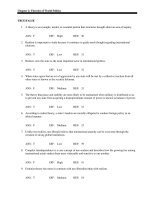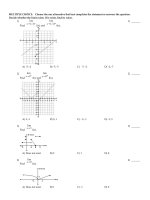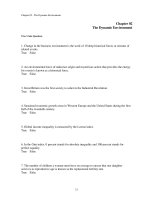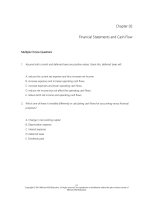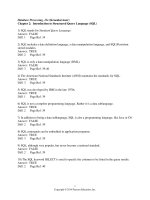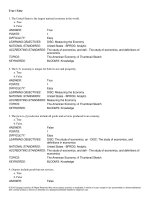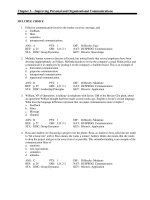Effective human relations interpersonal and organizational applications 13th edition reece test bank
Bạn đang xem bản rút gọn của tài liệu. Xem và tải ngay bản đầy đủ của tài liệu tại đây (67.01 KB, 15 trang )
Chapter 02 Improving Personal and Organizational
Communications
TRUEFALSE
1. Impersonal communication is the one-way transmission of facts, instruction, and the like.
(A) True
(B) False
Answer : (A)
2. For true communication to take place, the message must be understood by the person receiving it
in the same way the sender intended it to be understood.
(A) True
(B) False
Answer : (A)
3. Terms like added value or job satisfaction are examples of clear, concise language, not subject to
semantics.
(A) True
(B) False
Answer : (B)
4. Impersonal communication allows the person receiving the information to clarify vague or
confusing information.
(A) True
(B) False
Answer : (B)
5. Each country has a dominant language but most countries are multicultural.
(A) True
(B) False
Answer : (A)
6. Men typically use communication to establish and maintain relationships.
(A) True
(B) False
Answer : (B)
7. Gestures are a transnational means of communicating, in that they have the same or universal
meaning across cultures.
(A) True
(B) False
Answer : (B)
8. When a speaker's verbal and nonverbal messages conflict, others tend to believe the verbal
message.
(A) True
(B) False
Answer : (B)
9. The sender is 100 percent responsible for clear and effective communication.
(A) True
(B) False
Answer : (B)
10. The use of repetition, careful selection of words, and consideration of the timing of a message
are all effective ways to improve personal communication.
(A) True
(B) False
Answer : (A)
11. With the popularity of all the types of cell phones, smart phones, and tablet devices, we can
ignore many of the basics of communication etiquette.
(A) True
(B) False
Answer : (B)
12. When level of trust in an organization is low, it is best to communicate messages through the
grapevine.
(A) True
(B) False
Answer : (B)
13. Benefits of active listening can include stronger relationships, more and new information, and
fewer misunderstandings.
(A) True
(B) False
Answer : (A)
14. One of the best ways for management to cope with the grapevine is to identify the organization's
information leaders and use them to promptly and honestly clarify information heard via the
grapevine.
(A) True
(B) False
Answer : (A)
15. In a typical organization, employees are eager to share ideas and point out problems. Hence, it
is relatively easy for managers to build a climate that supports upward communication.
(A) True
(B) False
Answer : (B)
16. Effective use of social media requires us to be better spellers, write our ideas clearly, and
continue to use communication etiquette.
(A) True
(B) False
Answer : (A)
17. When managers demonstrate the desire to listen to their employees, employees still tend to keep
ideas and complaints to themselves.
(A) True
(B) False
Answer : (B)
18. Facebook, Twitter, and LinkedIn combine personal interaction and technology.
(A) True
(B) False
Answer : (A)
19. Hearing and listening are both innate abilities.
(A) True
(B) False
Answer : (B)
20. Using an informal e-mail address such as is appropriate in the business
setting because it seems unintimidating.
(A) True
(B) False
Answer : (B)
MULTICHOICE
21. Effective communication involves the sender, receiver, message, and
(A) feedback.
(B) filter.
(C) semantics.
(D) interpersonal communications.
Answer : (A)
22. Melinda, human resources director at Exceed, has noticed lately that several employees have
been dressing inappropriately on Fridays. Melinda decides to revise the company's casual Friday
policy and communicate it to employees by posting it on the company's e-bulletin board. This is an
example of
(A) horizontal communication
(B) grapevine communication
(C) interpersonal communication
(D) impersonal communication
Answer : (D)
23. William, VP of Operations, is talking via telephone with Javier, GM of the Mexico City plant,
about an agreement William thought had been made several weeks ago. English is Javier's second
language. What does the language difference represent that can make communication more
complex?
(A) Feedback
(B) Filter
(C) Message
(D) Channel
Answer : (B)
24. Rosa and Andrew are discussing a project over the phone. Rosa, as Andrew's boss, tells him she
wants to "hit a home run" with it. Rosa means she wants a winner; Andrew thinks she means that
she wants to drop the project and get as far away from it as possible. This misunderstanding is an
example of the communication filter of
(A) emotions.
(B) role expectations.
(C) semantics.
(D) attitudes.
Answer : (C)
25. Peter, marketing director at Shout, has been using PrintSmart products for years and feels that
they have served Shout's marketing needs well. Beth, head of Shout's technology department, has
discovered a new brand of products, TopPrint, and explains to Peter that she feels they should
switch brands. Peter is having difficulty listening to Beth's perspective because of his favorable
experience with PrintSmart. Peter's reaction to Beth is being filtered by
(A) emotions.
(B) role expectations.
(C) gender bias.
(D) attitudes.
Answer : (D)
26. Rana has been promoted to Director. Many of her colleagues that worked with her when she was
an assistant director may encounter challenges in working with her now due to which filter?
(A) Emotions
(B) Role expectations
(C) Nonverbal messages
(D) Language and cultural barriers
Answer : (B)
27. Women use conversation as a way to
(A) build and maintain relationships.
(B) negotiate.
(C) exchange information.
(D) discover differences and uniqueness.
Answer : (A)
28. The most communicative element of nonverbal communication is an individual's
(A) words.
(B) tone.
(C) personal space.
(D) eye contact.
Answer : (D)
29. When verbal and nonverbal messages match,
(A) it is critical to maintain eye contact.
(B) it gives the impression that you can be trusted.
(C) people can become suspicious of your intentions.
(D) the verbal message is dominant.
Answer : (B)
30. Mark has arrived at the company picnic and is looking forward to mingling with his colleagues
on the relaxing beach shore. He spots his boss near the grill and approaches to chat. In this
situation, Mark should chat at a
(A) personal distance of 18 inches to 4 feet.
(B) personal distance of 4 to 12 feet.
(C) social distance of 18 inches to 4 feet.
(D) social distance of 4 to 12 feet.
Answer : (D)
31. Author Maggie Jackson's thinks that today's distracting high-tech culture has significantly
diminished our ability to focus. It's difficult to think when there are/is
(A) many disruptions.
(B) many small jobs to do at one time.
(C) continuous information streaming in.
(D) all of the above
Answer : (D)
32. Critical listening involves a number of important skills, including
(A) being patient.
(B) analyzing presented information.
(C) using words carefully.
(D) demonstrating a listening attitude.
Answer : (B)
33. Barbara wants to be a more empathic listener. To do that, she needs to
(A) practice patience and be nonjudgmental when listening.
(B) take notes and ask reflecting questions.
(C) listen primarily for facts and avoid semantic confusion.
(D) question what is said but demonstrate agreement with it.
Answer : (A)
34. Amy informs her employees that they can offer any constructive criticism regarding her
leadership style by placing anonymous notes in her mailbox. This is an example of
(A) telecommuting.
(B) an informal communication channel.
(C) a formal communication channel.
(D) upward communication.
Answer : (D)
35. John (VP of finance), Evie (manager of accounting), and Rebecca (a staff accountant) are
discussing an upcoming audit. In terms of organizational communication, this is an example of
(A) the grapevine.
(B) horizontal communication.
(C) vertical communication.
(D) telecommuting.
Answer : (C)
36. Horizontal communication within an organization carries messages
(A) among people on the same level of authority.
(B) among all employees.
(C) between top executive levels and the lowest levels of the organization.
(D) only in written form.
Answer : (A)
37. Nancy heard from Molly, a coworker, that Amy was going to become their new supervisor. Molly
heard the news from John, a friend from another department. This is an example of which form of
organizational communication?
(A) Impersonal communication
(B) Horizontal communication
(C) Network communication
(D) The grapevine
Answer : (D)
38. One of the most effective ways to improve organizational communication is to
(A) promote the use of the grapevine.
(B) create a nonthreatening climate to encourage upward communication.
(C) communicate everything in writing.
(D) communicate everything vertically.
Answer : (B)
39. The use of e-mail
(A) offers greater message privacy than normal written correspondence.
(B) is effective in building rapport.
(C) is always the quickest way to communicate.
(D) has accelerated the pace of exchanging information.
Answer : (D)
40. Joshua got a promotion but the job involves moving to Brazil. He can be more successful if he:
(A) talks with Brazilians living in America.
(B) learns the language with tapes.
(C) increases his cultural intelligence.
(D) does a good job there.
Answer : (C)
41. Enterprise social networks:
(A) include Facebook and LinkedIn.
(B) improve collaboration on projects across organizational departments.
(C) have a negative impact on job satisfaction.
(D) are now in use among about 10% of Fortune 500 companies.
Answer : (B)
42. Because it saves money and time, facilitates globalization, and accommodates the virtual office,
_____ communication has become increasingly prevalent in the business world.
(A) digital
(B) face-to-face
(C) voice mail
(D) informal
Answer : (A)
43. Barry is leaving a voice mail message for a vendor. Which of this statements would not be
considered necessary to avoid phone tag?
(A) "My phone number is [Barry's phone number with area code]."
(B) "I am always at my desk to take calls between 8 and 11:30 a.m. Eastern Time."
(C) "I am calling to request a change to order #5062; please increase the quantity to 150."
(D) "Your firm is the only vendor who can supply the item we need in the color we want."
Answer : (D)
44. An appropriate use of organizational e-mail would be to:
(A) build rapport with a new client or customer quickly.
(B) reveal to a coworker that you find her or him very attractive and would like to date.
(C) provide the duty roster for the upcoming month to a group of employees.
(D) warn others about a coworker's frequent mistakes and recent poor job performance.
Answer : (C)
45. Case 2.1
B.F.E., Inc. is changing its employee benefits plan. Some of the changes will be positive and some
will take current benefits away. As vice president of human resources, Cynthia is concerned that the
communication to the employees be as accurate as possible. When the changes are communicated
from management to the employees, a small group of employees reacts negatively. The employees
don't like the changes and feel the company once again is taking advantage of them, even though
the positive changes outweigh the negative ones. This group sends a representative to Cynthia to
express their concerns. Cynthia is anxious to understand this group's concerns.
Refer to Case 2.1. The few dissatisfied employees have filtered the company's message through their
(A) role expectations.
(B) attitudes.
(C) semantic filters.
(D) gender bias.
Answer : (B)
46. Case 2.1
B.F.E., Inc. is changing its employee benefits plan. Some of the changes will be positive and some
will take current benefits away. As vice president of human resources, Cynthia is concerned that the
communication to the employees be as accurate as possible. When the changes are communicated
from management to the employees, a small group of employees reacts negatively. The employees
don't like the changes and feel the company once again is taking advantage of them, even though
the positive changes outweigh the negative ones. This group sends a representative to Cynthia to
express their concerns. Cynthia is anxious to understand this group's concerns.
Refer to Case 2.1. In order to better understand the disgruntled employees' concerns, Cynthia needs
to
(A) use clear, concise language.
(B) use her active listening skills.
(C) use horizontal communication.
(D) engage in squelching grapevine communication.
Answer : (B)
47. Case 2.1
B.F.E., Inc. is changing its employee benefits plan. Some of the changes will be positive and some
will take current benefits away. As vice president of human resources, Cynthia is concerned that the
communication to the employees be as accurate as possible. When the changes are communicated
from management to the employees, a small group of employees reacts negatively. The employees
don't like the changes and feel the company once again is taking advantage of them, even though
the positive changes outweigh the negative ones. This group sends a representative to Cynthia to
express their concerns. Cynthia is anxious to understand this group's concerns.
Refer to Case 2.1. By listening to a representative of the group, Cynthia is
(A) squelching grapevine communication.
(B) using a formal horizontal channel to communicate.
(C) being proactive in trying to build trust.
(D) eliminating filters.
Answer : (C)
48. Case 2.1
B.F.E., Inc. is changing its employee benefits plan. Some of the changes will be positive and some
will take current benefits away. As vice president of human resources, Cynthia is concerned that the
communication to the employees be as accurate as possible. When the changes are communicated
from management to the employees, a small group of employees reacts negatively. The employees
don't like the changes and feel the company once again is taking advantage of them, even though
the positive changes outweigh the negative ones. This group sends a representative to Cynthia to
express their concerns. Cynthia is anxious to understand this group's concerns.
Refer to Case 2.1. The best way for B.F.E. to encourage feedback from the employees is to
(A) create a nonthreatening environment.
(B) communicate the plan change in a memo.
(C) remember that women will be concerned with people issues, men with events and things.
(D) make the employees accept responsibility for understanding the communication.
Answer : (A)
49. Case 2.1
B.F.E., Inc. is changing its employee benefits plan. Some of the changes will be positive and some
will take current benefits away. As vice president of human resources, Cynthia is concerned that the
communication to the employees be as accurate as possible. When the changes are communicated
from management to the employees, a small group of employees reacts negatively. The employees
don't like the changes and feel the company once again is taking advantage of them, even though
the positive changes outweigh the negative ones. This group sends a representative to Cynthia to
express their concerns. Cynthia is anxious to understand this group's concerns.
Refer to Case 2.1. As vice president of human resources, Cynthia wants to communicate the changes
in benefits to the employees clearly with an opportunity for response. Her best communication tool
for this would be
(A) the grapevine.
(B) the horizontal communication channel.
(C) a memo from her department.
(D) e-mail with a way for employees to ask questions.
Answer : (D)
SHORTANSWER
50. ____________________ helps a communicator determine whether or not the information has been
understood in the way they intended.Answer : Feedback
51. The communication process involves a number of filters. When the meaning of the words used in
a communication is not clear because of their abstraction and lack of precise meanings, the
communication problem is one of ____________________.Answer : semantics
52. ____________________ communication is a one-way process that transfers basic information such as
instructions, policies, and data.Answer : Impersonal
53. Maria was recently promoted to management and discovers that some of her coworkers don't
take her suggestions seriously. Her communication may be filtered by ____________________.Answer :
role expectations
54. Eye contact, facial expressions, gestures, and personal space are all examples of
____________________.Answer : nonverbal messages
55. ____________________ is the process of encouraging employees to share their feelings and ideas
with their managers.Answer : Upward communication
56. During a political speech, Carlos practices ____________________ skills by focusing on the speaker,
taking notes, and eventually asking questions.Answer : active listening
57. Tien is a middle-level manager. An employee is complaining about a company policy. Tien is
being patient, acknowledging what the employee is saying without being judgmental. Tien is using
____________________.Answer : empathic listening
58. Jim, Anna, and Hung are three first-line supervisors. They are discussing a resource problem
that affects all three of their respective areas of responsibility. Their conversation is an example of
____________________ channels of communication in their company.Answer : horizontal
59. The ____________________ is an informal communication channel that carries information, often
unofficial, in many different directions.Answer : grapevine
ESSAY
60. Differentiate between impersonal and interpersonal communication.
Graders Info :
Impersonal: one-way communication, usually in written form, used to give basic information. There
is seldom opportunity to clarify or question. Interpersonal: two-way communication for sharing
information. Goal is to build relationships through the communication process. The parties interact
and the receiver provides feedback.
61. Identify three types of effective listening and give examples of each.
Graders Info :
Active: give speaker your full attention, display body language that shows you are listening, ask for
feedback as to what you think you are hearing. Critical: listen for evidence that supports and
challenges what you are hearing. Empathic: avoid being judgmental, acknowledge what is said, and
be patient.
62. Provide a few examples of nonverbal messages and describe how they affect the communication
process.
Graders Info :
Research suggests that the nonverbal messages we convey through eye contact, facial expressions,
tone, gestures, appearance, posture, personal space, etc. have more impact than our verbal
messages. If our verbal and nonverbal messages match, we give the impression that we can be
trusted and that what we are saying in believable. When the messages aren't consistent, the listener
is more likely to believe the nonverbal messages.
63. Discuss how communication in the business world has changed with social media and mobile
devices.
Graders Info :
You can always be available to talk to your customers, clients, or co-workers. You have less privacy
as messages can be viewed by your employer, especially when transmitted using their devices or
networks. Also, they can be forwarded on to another person or many people. Observing good
communication etiquette is more important than ever since the absence of rapport and nonverbal
cues increases the risk of misunderstanding when a message is read by a large and diverse
audience.
64. Identify the continuous loop of communication and five filters that interrupt the loops.
Graders Info :
Sender generates the message and directs it to the receiver, who receives the message and then
generates feedback directed back to the sender. Filters could include semantics, emotions,
language/culture, attitudes, role expectation, gender-specific focus, and nonverbal messages.
65. Briefly describe the formal and informal channels that communication travels within an
organization.
Graders Info :
Formal: Horizontal (between people on the same level of authority) and vertical (information travels
up and down the levels of authority) channels. Informal: The grapevine (information passes
unofficially in many directions through a web-like pathway).
66. What guidelines should you follow when using e-mail in organizational communication?
Graders Info :
(1) Know and adhere to your company's e-mail policies, being mindful that your e-mails are probably
monitored and retained indefinitely. (2) Use a professional-sounding e-mail address. (3) Create a
descriptive subject line that the recipient can scan in order to determine the urgency and
importance of your message. (4) Compose clear, concise messages that are simply written, effective
in conveying the right information, necessary (not trivial), and task focused. (5) Recognize e-mail's
limitations and ensure your message can be correctly interpreted without rapport or nonverbal cues.
67. Describe three examples of how one's blog may encounter problems due to filters that could
occur with this type of communication.
Graders Info :
Answers will vary.
68. Describe three skills necessary to being an effective listener. Identify some benefits associated
with effective listening.
Graders Info :
Answers will vary.
69. An organization's communication process travels within "channels." Describe the two main types
of channels of communication and subsequent lines of communication within each type of channel.
Graders Info :
Answers will vary.
